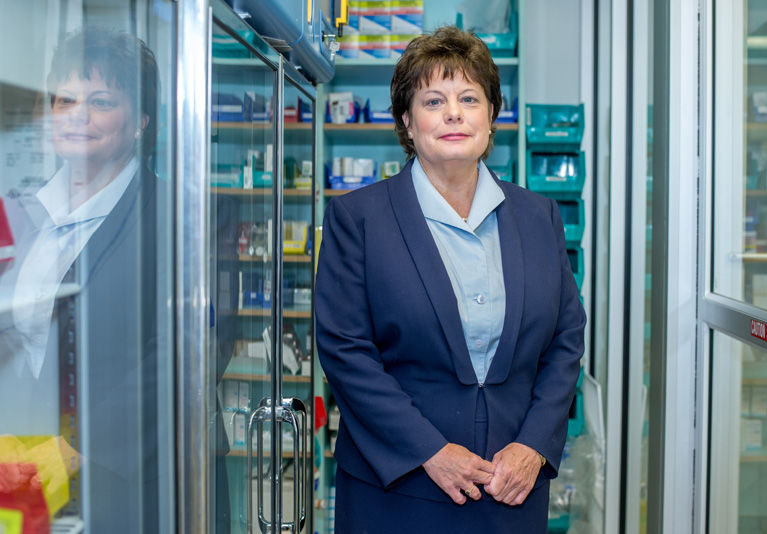
Some months before the new $48 million Scully-Welch Cancer Center officially opens, Wanda Kay North is already taking the first behind-the-scenes steps to raise the center’s profile and, she hopes, bring new hope to Vero area cancer patients.
North, the clinical research director for the Cancer Center, sports an alphabet-soup collection of letters after her name, (PhD, MBA, RN, CCRC and CIM), along with a cancer-fighting tenacity born of having both her mother and her niece afflicted by the disease.
North’s goal is to involve the new Vero Beach facility in a series of clinical trials with a variety of strategic partners in an effort to develop safer, more effective cancer treatments.
“We will be working closely with physicians in our community,” explains North, “and with the Duke Cancer Network to help identify studies that will best meet the needs of our patients” in searching for clinical trial opportunities.
What, exactly, is a clinical trial? The National Institutes of Health says, “Clinical trials are at the heart of all medical advances. Clinical trials look at new ways to prevent, detect, or treat disease. Treatments might be new drugs or new combinations of drugs, new surgical procedures or devices or new ways to use existing treatments. The goal of clinical trials is to determine if a new test or treatment works and is safe.”
For people not responding well to established treatments, clinical trials can be the last best hope for a cure.
North says she is hopeful the first Scully-Welsh clinical trials can begin this summer but there’s a whole flock of different ducks to get into a row before that happens.
A “human resources protection program” had to be established to protect the privacy and the rights of patients in the trials. Now a “clinical research committee” needs to be created and that committee must quickly transition into what’s known as an “Institutional Review Board.”
NIH says that clinical trials in the United States must be approved and monitored by an Institutional Review Board (IRB) in order to ensure the risks to patients are minimal and the potential benefits worth any risks that are involved. The IRB will consist of physicians and other members of the community and will be charged with determining that any clinical trials undertaken are both ethical and protective of the rights of participants.
Then, too, North continues, the center’s “Alliance application” has only just been submitted.
That’s a reference to the “Alliance for Clinical Trials in Oncology” which is part of a national network sponsored by the National Cancer Institute.
The Alliance is comprised of nearly 10,000 cancer specialists at various hospitals, medical centers and clinics across the country with the aim of testing promising new cancer therapies as well as researching the best methods to alleviate the side effects of cancer and cancer treatments. That application must be approved before trials can be undertaken.
Then there’s the matter of money.
Just one clinical trial or study, says the soft-spoken North, “can cost over $100 million. I believe I read at one time in Forbes that the average drug developed by a major pharmaceutical company costs at least $4 billion and can be as much as $11 billion.”
(In fairness, there are trials and then there are trials. Some, according to North, can be as short as 30 days while others can run three or more years. Longer trials, not surprisingly, cost more money.)
Still, the importance of strategic partnerships with the likes of the Duke Cancer Network and major pharmaceutical companies is obvious. While grants from federal agencies such as NIH and the National Science Foundation are the lifeblood of many clinical trials, Forbes Magazine also says that pharmaceutical firms account for about 85 percent of all funding for drug trials. (Those same pharmaceutical firms reap the benefits if and when the Food and Drug Administration approves a new drug, so they’re willing to invest heavily in clinical trials.)
Private donors and the Indian River Medical Center along with Medicare and the oncology alliance will also be involved in helping fund the Scully-Welsh efforts.
North, who came to Vero last September from St. Joseph’s/Candler hospital in Savannah, GA where she spent 20 years helping to build that institution’s research department, says she still views each clinical trial on a personal level.
“At times,” North states in a matter-of-fact manner, “clinical trials may be the only option for patients,” adding that currently (local) patients, “do not have access to clinical trials unless they travel outside the community. Often patients are extremely sick and having to travel becomes almost impossible because they don’t have the support system of family and friends.”
North’s ambitious plan to launch the first ever round of clinical trials at the Scully-Welsh Cancer Center less than a year after arriving here in Vero Beach pales in comparison to what she sees down the road.
“We have a higher incidence of breast and lung cancer in Indian River County so we want to ensure we have the appropriate studies (trials) to offer this population,” she says, but quickly adds she plans to have, “numerous studies going on at any one time.” North points to colon, bladder and prostate cancers as also being on her radar as potential clinical trial candidates.
When asked for a timeline of when she wants to start seeing results from these trials, North has a simple, one-word reply. “Yesterday,” she exclaims.



